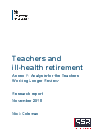Teachers working longer as a result of changes to the pension age

A report into the implications of teachers working longer as a result of changes to the pension age.
Documents

Teachers working longer review: final report
PDF, 305KB, 28 pages

Annex A: the impact of teachers working longer – rapid evidence assessment
PDF, 1.8MB, 80 pages

Annex B: employment practice – rapid evidence assessment
PDF, 1.06MB, 128 pages

Annex C: details of documents submitted in response to the calls for evidence
PDF, 193KB, 6 pages

Annex D: stage 2 call for evidence and emerging themes
PDF, 185KB, 6 pages

Annex E: working in the teaching profession beyond normal pension age
PDF, 495KB, 39 pages

Annex F: teachers and ill-health retirement: analysis for the teachers working longer review
Ref: ISBN 978-1-78105-727-8, DFE-RR865PDF, 953KB, 64 pages
Details
Final report of the review into the health and deployment implications of teachers working longer as a result of the increase in normal pension age in the teachers’ pension scheme.
Teacher trade unions, employers and DfE took part in the review.
Recommendations 1. Culture: There needs to be greater recognition and celebration of older teachers as an important part of the teaching workforce. Evidence clearly shows that age is no barrier to a teacher’s ability to provide effective outcomes for children and young people. In particular, it shows that the cognitive abilities needed to teach effectively do not t 21 However, it is clear that many teachers and their managers do not understand the TPS provisions, particularly in relation to ill health or phased retirement, and there is even some confusion about what their own retirement age is in some cases. Literature targeted at educating teachers from the start of their careers should be developed in order to educate them as soon as possible as to their options and the value of the pension. Enabling a good understanding of the TPS within the teaching profession will mean that teachers can make informed decisions about their career and retirement options. Employers too need support in understanding the scheme to improve the support they provide teachers and understand how they can use the scheme to support recruitment and retention of teachers, in particular by allowing flexible working. The current review of the employer’s role in the TPS is likely to help. Because of that, TP will be re-visiting guidance and taking over some of the member related TPS administration from employers in 2017. This will include sending information about the TPS to new members, including providing information about scheme flexibilities. Action: TP to continue to consult different age groups of teachers and employers to understand what they need and when – and, depending on that feedback, aim to: • improve the on-line portal with, for example, additional simple factsheets, calculators and more personalised pension account information; • consider the best ways of educating and communicating with teachers, and managers; • work with employers to provide accessible training for teachers on pensions and retirement planning; and • provide those joining ITT with access to information about pensions as part of career management training. 3. There needs to be consistent and effective support for teachers’ physical, mental and emotional health and well-being throughout their career. Ill health accounts for a relatively small proportion of early exits from teaching and sickness absence rates are low compared to other professions, nevertheless teachers themselves cite health as a major concern in being able to work longer and there will be new challenges involved in maintaining physical, mental and emotional health and well-being as more teachers work into their sixties. When integrated with effective sickness absence and management practices, a good quality and responsive occupational health service can help: avoid illness and injury occurring in the first place; provide appropriate support in treating and managing conditions once they appear; and help determine options where adjustments or choices need to be determined. Currently the extent to which such support is valued or available varies significantly, whereas it should be the norm that teachers and employers have access to good quality occupational health support whenever needed. 22 Available evidence does not show a clear link between issues of ill health and particular types of teaching role or working in particular environments/settings (e.g. urban areas or schools with higher rates of deprivation/lower attainment). Nevertheless, managers need to be alert to the potential need, and sources of support in how to redesign roles or consider redeployment where necessary. Action: Consideration should be given to further research into and ways of spreading good practice with a view to: • providing guidance and training for managers as to how they can better support people’s health and well-being, such as spotting the early signs of ill health, managing sickness absence and facilitating good rehabilitation, which the Group may support and challenge as work progresses; • promoting the value of good occupational health support, and within that investigate the potential for schools to, as a minimum, tap into the services of the national Fit for Work Service to provide targeted occupational health support; • identifying examples of how schools have effectively overcome challenges faced by individual teachers who are suffering from physical and mental ill health or living with long-term health conditions, in particular through job redesign or redeployment; • looking within the Department to establish links with the work on strengthening QTS and improving teacher career progression and teacher retention work to ensure that older workers are very much a focus of that work; and • considering within the Department how effective the current ill-health provisions within the TPS will prove when more teachers work into their sixties. 4. Managers need more support in managing an age diverse workforce and getting the best out of older teachers Whole career planning is a key way in which to help those who choose to work longer to do so. Managers have a key part to play through ensuring regular open and clear dialogue with teachers about the support they need to meet the challenges faced at different stages in their career. That will in turn ensure teachers feel valued and have a real part to play in determining their career whilst also ensuring schools get the best out of all teaching staff. Challenges facing teachers include: dealing with health or caring issues; how to maintain or develop skills in order to meet expectations or career development aspirations; how to ensure effective interaction with younger teachers; and planning for their career and retirement. Embedding age management/career and development conversations within regular performance management conversations should be the norm for teachers of all ages, and is an ideal way of ensuring the right conversations take place. Different types of conversations will need to take place throughout a teacher’s career depending on their circumstances, their age, their ambitions and so on. As part of that, at a certain point, teachers may want to have a more focused conversation about their later 23 career and retirement options. Understanding those options, with support from managers, will enable them to make the right choice for them. At present, the extent to which such thinking and discussions take place varies significantly. Some of that is down to lack of understanding of the benefits involved, particularly for the school, but it is also the case that managers can be fearful of having such conversations due to a lack of knowledge of rights and responsibilities. Managers need support to understand the legal issues surrounding employment and individual rights. They also need support in recognising the benefits involved and in structuring conversations effectively to ensure all relevant issues are covered. They need to be supported to be able to ask open questions of their staff, in the context of career management and without the perception from staff members that the conversation is really about when they are going to retire. Action: Guidance and training packages should be available to ensure managing an age diverse workforce, supporting flexible working, career planning etc. are all normal parts of career and workforce management. Ideally, these should start from initial teacher training stage onwards and be covered in depth in leadership development programmes. In addition, performance management policies should be adapted to ensure these issues are integral in regular review conversations. There is also value in looking at whether these should in fact be separate career management conversations that sit alongside and are equally important as performance management conversations. 5. Greater promotion and implementation of flexible working across all schools to support a more inclusive age-diverse culture Teachers should have the opportunity to change their role, working pattern and/or working environment at any stage of their working life, as these types of flexible working arrangements are key to supporting those who wish to work beyond NPA. Where teachers are able to change or reduce their working hours and level of responsibility, it enables them to, for example, manage care responsibilities and has a positive impact on their health and well-being. Some teachers in the latter stages of their careers may simply want to reduce their work commitments and achieve a better balance between work and home. Flexible working opportunities have to be balanced against the needs of pupils and the school but it is possible to do that in a way that works for all. For example, timetabling should be matched to a flexible working policy which includes a range of creative working arrangements – including the ability to job-share at a senior level – to appeal to the varied needs of older staff. As well as being more flexible, managers need to be creative in ensuring that all staff contribute to the school. For example, more mentoring and coaching roles by older staff members will benefit younger teachers as well as ensuring older members feel 24 (and are) valued. This could form a part of support for a strengthened QTS. Older staff may also have the experience to take on other roles if teaching time is reduced, such as managing school improvement projects. The Department has produced guidance on flexible working at: https://www.gov.uk/government/uploads/system/uploads/attachment_data/file/593990 /DFE_Flex_Working_Guidance_2017_FINAL.pdf Action: Further consideration of flexible working practices for teachers, the barriers, and how these can be addressed, with a view to: • the Group commissioning work to assess the adequacy and impact of the existing guidance on flexible working • developing guidance for managers in assessing how roles, working patterns and the working environment can be changed to accommodate more teachers working longer; and • communications to encourage and develop flexible working patterns in schools so that flexible working is encouraged, becomes the norm, and is valued – for example, highlighting how schools have overcome the barriers and what benefits they have seen as a result retaining valuable, experienced talent. 6. Ensure that the work of this group and their findings are fed into and inform the various programmes across the Department for example, those to promote flexible working and reduce teacher workload. The issues involved in helping teachers to work longer include and are inextricably linked with issues associated with maintaining the health of the profession as a whole. Action: The Department and all group members must ensure that flexible working guidance, steps to address workload issues and other new initiatives take due account of the needs of a more age diverse workforce. 7. Further Collection and Analysis of Data The Group is mindful that the evidence and initial conclusions are based on only those teachers who have chosen to work longer and therefore will need to continue to consider the data and review impacts as more teachers work until, or near to State Pension Age. Further data should also be collated over the coming years to monitor whether the current ill-health arrangements are appropriate to an older working population. The data will also inform Government’s policy on whether the link between SPA and NPA continues to be appropriate to the teaching profession as time goes on. Stakeholders will want to use this data and information to contribute to government reviews of the state pension age (SPA) and the link between NPA and SPA in public 25 sector schemes. The findings also need to be played into the Department’s Teacher Workload project. There is also a lack of comprehensive data on why teachers leave the workforce and this makes it more difficult to design policies and take measures to reduce the loss of talent from the profession. The Department will consider the work of this Group in future research. Action: The Group should identify on an ongoing basis which data is available to: • support and monitor delivery of the recommendations; • continue to measure the impact of working longer; and • understand why teachers leave the profession. 8. Continuation of the Working Longer Review There needs to be a concerted effort by all parties to raise awareness around the fact that teachers will generally be working to older ages in future, as part of a national trend for longer lives. Teachers need to be supported in managing their health and careers appropriately. Schools need assistance in fostering a positive age-diverse culture that values all age groups, and recognises and gives opportunity to the skills and experiences that older teachers can contribute. The actions suggested in this report will help provide the support that teachers and schools need, and it makes sense therefore for the review group to continue, both to monitor developments and support delivery. Within that, it should be recognised that there are gaps in evidence currently, for example, to help inform on whether the link between SPA and NPA continues to be appropriate, which need to be addressed and the review group will be ideally placed to assess how those gaps are being addressed and what actions are needed in light of the further evidence. Action: The Group should continue as there is work to be done, and the Group will play a role in carrying out some of the recommendations, and monitoring the progress of others. All parties to consider how awareness can be improved, for example, through communications that encourage teachers to plan ahead for retirement, that highlight success stories of teachers who choose to work beyond NPA currently, and what schools can do to support an ageing and multi-generational workforce.











Responses